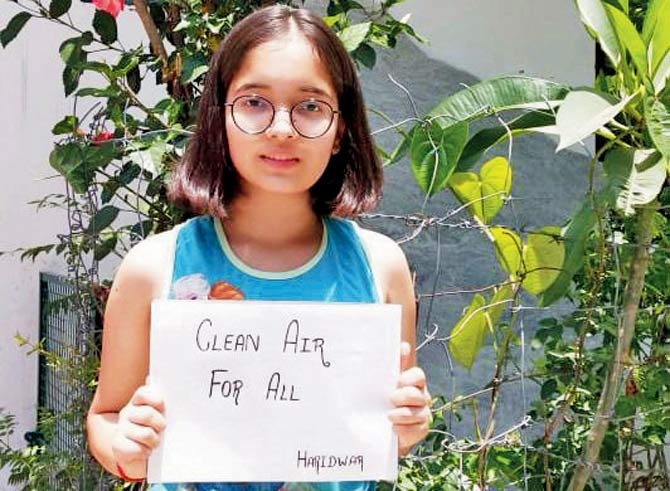With the country breathing the cleanest air in over two decades, climate activists urge everyone to unite and ask for strict measures to maintain the air quality after lockdown lifts

A deserted Chhatrapati Shivaji Maharaj Chowk in Chembur, on Sunday, which almost always sees a traffic jam. Pic/Sameer Markande
The nationwide lockdown that kicked in on March 25 is having a positive effect on the environment. With millions of cars off the streets, factories closed, construction activities at a halt, India is witnessing the cleanest air we have breathed in over two decades.
India has 21 of the world's top 30 cities with the worst pollution levels. The lockdown has brought a steady dip in the Air Quality Index (AQI) with average levels hovering around 60. In cities like Delhi, this number was well over 400 (hazardous) during peak winter.
The plan
A new video by Jhatkaa.org released on the 60th day (May 23) of India's lockdown, aims to get this message across. Titled #SaalBhar60, the video calls on citizens to participate in a nationwide digital movement on June 5 — World Environment Day by sharing photos demanding clean air for all.

Ridhima Pandey, 12-year-old climate activist
According to the National Clean Air Programme (NCAP), India has 122 non-attainment cities — cities that don't meet the National Ambient Air Quality Standards. Maharashtra tops this list, with 18 cities in the state.
The initiative invites citizens to participate in the biggest digital movement, the country has seen, demanding Saal Bhar 60 — asking the government to put in place concrete measures to ensure the air quality in India remains within permissible, healthy standards even after the lockdown ends.
The video features 12-year-old climate activist from Dehradun, Ridhima Pandey, who was one of the 16 children (alongside Greta Thunberg) to petition the UN in September last year, on governments' inaction towards combating climate change.
A recent IIT Delhi study states that if the low pollution levels India experiences during the lockdown are maintained, it could bring down the country's death toll by 6.5 lakh.
'What comes next?'
"This week, as lockdown norms were eased, the air quality levels in Delhi spiked to 200. This confirms our worst fears in a post-lockdown world. While we saw nature begin its healing, what comes next? Do we go back to experiencing toxic air, and the serious health repercussions it has? We have made strides towards acknowledging the severity of the problem — as evidenced by initiatives like NCAP. But we need concrete state-wise planning and implementation for Saal Bhar 60 to be a reality. And no better time for that than now," Shikha Kumar, campaigns manager, Jhatkaa.org, said.
"In the past two months, it felt like all things my generation has been fighting were gifted to us — blue skies, low emissions, clean air. This only means that an AQI of Saal Bhar 60 is possible. Our government needs to treat it like the emergency and have strict timelines for bringing down pollution levels. Breathing clean air is a basic right," says Ridhima Pandey.
122
No. of non-attainment cities India has
Data for Mumbai
As per a report by SAFAR, between March and April, Mumbai has witnessed maximum percentage reduction of two pollutants — nitrogen dioxide (NO2) and particulate matter (PM) 2.5. While the city saw a 76 per cent drop in NO2, there was a 54 per cent drop on PM2.5
AQI of Mumbai for last 11 days
May 13: 54
May 14: 48
May 15: 51
May 16: 55
May 17: 90
May 18: 79
May 19: 56
May 20: 28: Lowest AQI for Mumbai recorded in 2020 so far
May 21: 36
May 22: 30
May 23: 32
AQI for pollutants
0-50 range: Good
51-100 range: Satisfactory
101-200: Moderate
201-300: Poor
301-400: Very Poor
Above 400: Severe
What is AQI?
Air quality index (AQI) is an index for reporting air quality on a daily basis. It is a measure of how air pollution affects one's health within a short time period. The purpose of the AQI is to help people know how the local air quality impacts their health.
Catch up on all the latest Mumbai news, crime news, current affairs, and a complete guide from food to things to do and events across Mumbai. Also download the new mid-day Android and iOS apps to get latest updates.
Mid-Day is now on Telegram. Click here to join our channel (@middayinfomedialtd) and stay updated with the latest news
 Subscribe today by clicking the link and stay updated with the latest news!" Click here!
Subscribe today by clicking the link and stay updated with the latest news!" Click here!







